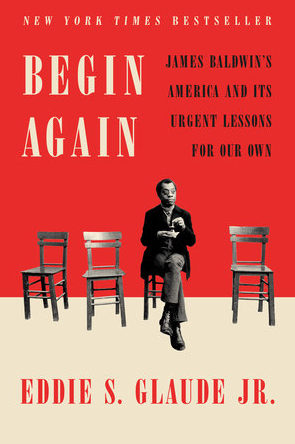Begin Again
by Eddie S. Glaude Jr.
reviewed by Hardeep Sidhu
In 1979, over a decade after the assassination of Martin Luther King Jr., an interviewer asked James Baldwin to reflect on the civil rights struggle. Baldwin had been a key player in the movement, with Malcolm X calling him “the poet of the revolution,” and King praising his testimony to the “problems of being black in a multiracial society.”
But Baldwin also felt it his duty to correct the triumphalist story of civil rights that had already begun to form. Baldwin recast the movement as a “slave insurrection.” Baldwin not only demythologized the era in retrospect—he also found in it sources of hope. “On one level,” according to Baldwin, “the civil rights movement was betrayed, but on a much more important level, we all learned something tremendous out of that effort and out of the betrayal something important about ourselves.”
What Baldwin learned, and how he endured the betrayal of civil rights, is the subject of Eddie S. Glaude Jr.’s timely new book, Begin Again: James Baldwin’s America and Its Urgent Lessons for Our Own. With the emergence of Black Lives Matter, a new generation of readers has ushered in a Baldwin revival. But today’s readers often reach only for the early Baldwin—the Baldwin of the civil rights years—and are therefore “only grasping a part of his gift,” according to Glaude. “We cannot cordon off his rage and leave behind the later works.” Americans need that wisdom and rage now, Glaude argues, because the nation is again in the downswing of a tragic cycle: the United States commits to multiracial democracy, reneges, and renews its allegiance to a racial hierarchy. Reconstruction gets counteracted by violent white redemption and Jim Crow; the Reagan Revolution offers a sharp rebuke to the civil rights era; the age of Barack Obama and Black Lives Matter gives birth to Trumpism.
Begin Again follows the trail that Baldwin blazed in his own “after times” to show a way through the “after times” of today. The book is a vivid guide to Baldwin’s insights into racism and American life. Glaude has a knack for bundling complex ideas in compact, memorable phrases. In his previous book, Democracy in Black, Glaude posited the “value gap” to describe the moral failing underwriting racial inequities: the US demonstrably values white lives more than the lives of others. In Begin Again, Glaude describes “the lie”: “a broad and powerful architecture of false assumptions by which the value gap is maintained.” Bearing witness to the lie in all its manifestations is one of Baldwin’s great themes. The lie is the myth of Black inferiority, also the belief that the US is “fundamentally good and innocent, its bad deeds dismissed as mistakes corrected on the way to ‘a more perfect union.’”
Begin Again presents a compelling portrait of a dynamic thinker who continued to evolve long after the civil rights era. It is, however, only a partial portrait. I find it odd that Glaude ignores Baldwin’s novels altogether, given his case for not writing off the later works. (Baldwin published more pages of fiction than nonfiction by a wide margin.) In his novels, stories, and plays, Baldwin breathes life into the arguments of his essays, often pushing them in new directions. More importantly, I’m surprised at how many of Baldwin’s key concerns Glaude skims over. In later years Baldwin’s analysis became international in scope: his simmering critique of capitalism and imperialism came to a boil, and his analysis of American masculinity and representations of queer lives took on new force. But Begin Again barely touches on Baldwin’s anti-capitalism, anti-imperialism, or queerness, even though these facets of his thought were critical to Baldwin’s analysis of American racism.
Begin Again is, by Glaude’s own admission, a “strange book”: it melds criticism with biography, memoir, and commentary. The upside of this approach is that readers don’t need to have read Baldwin to benefit from reading Glaude, who does not think about Baldwin so much as he “thinks with Baldwin.” Each chapter distills a lesson from Baldwin’s later life and work: recognize the lie; bear witness to betrayal; do not try to “save white people”; take refuge in community; and so on. Through engaging readings of Baldwin’s work, Glaude tracks Baldwin’s evolving relationship with white audiences, with the politics of Black Power, and with his own memory of past traumas, both personal and collective.
The best chapters of Begin Again invoke Baldwin’s belief that the nation’s current problems stem from Americans’ inability to confront their history. “History,” argues Baldwin, “does not refer merely, or even principally, to the past .… [H]istory is literally present in all we do.” Glaude shows readers the presence of history, and the difficulty of facing up to it honestly, by looking not only to obvious places—recent conflicts over Confederate statues—but also to unexpected ones, like celebratory histories of the civil rights movement that uphold the myth of American exceptionalism. “[I]n the end,” Glaude urges, “we have to allow [the] ‘innocent’ idea of white America to die. It is irredeemable, but that does not mean we are too.”
Published on May 10, 2021

